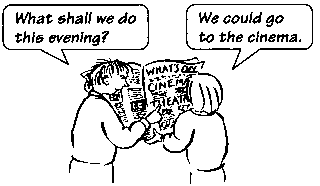Unit 27. Could (do) and could have (done)
(использование оборотов could (do) и could have (done))
We use could in a number of ways. Sometimes could is the past of can (see
Unit 26):
- Listen. I can hear something. (now)
- I listened. I could hear something. (past)
|
Can is also possible in these sentences ('We can go for a walk.' etc.). Could is less sure than can.
You must use could (not 'can') when you don't really mean what you say. For example:
- I'm so angry with him. I could kill him! (not 'I can kill him')
- The phone is ringing. It could be Tim.
- I don't know when they'll be here. They could arrive at any time.
- The phone is ringing. It might be Tim.
- I'm so tired. I could sleep for a week. (now)
- I was so tired. I could have slept for a week. (past)
- Why did you stay at a hotel when you went to New York? You could have stayed with Barbara.
(= you had the opportunity to stay with her but you didn't) - Jack fell off a ladder yesterday but he's all right. He's lucky - he could have hurt himself badly.
(but he didn't hurt himself) - The situation was bad but it could have been worse.
- We could go away if we had enough money.
(= we would be able to go away) - I don't know how you work so hard. I couldn't do it.
- Why didn't Liz apply for the job? She could have got it.
- We could have gone away if we'd had enough money.
- The trip was cancelled last week. Paul couldn't have gone anyway because he was ill.
(= he wouldn't have been able to go) - You did very well to pass the exam. I'm sure I couldn't have passed it.
(= I wouldn't have been able to pass it if I had taken it)
(использование оборотов must и can't).
See Unit 29. Could and might
(использование оборотов may и might 1).
See Unit 36. Could I/you …?
(использование оборотов Can/ Could/ Would you …?).
See Unit 37. Could with if
(использование оборотов If I do … и If I did …).
See Unit 38. Could with if
(использование оборотов If I knew … и I wish I knew …).
See Unit 39. Could with if
(использование оборотов If I had known … и I wish I had known …). хостинг для сайтов © Langust Agency 1999-2024, ссылка на сайт обязательна
![агентство Лангуст [переход на главную] Агентство Лангуст [переход на главную]](/pic/logo.gif)


